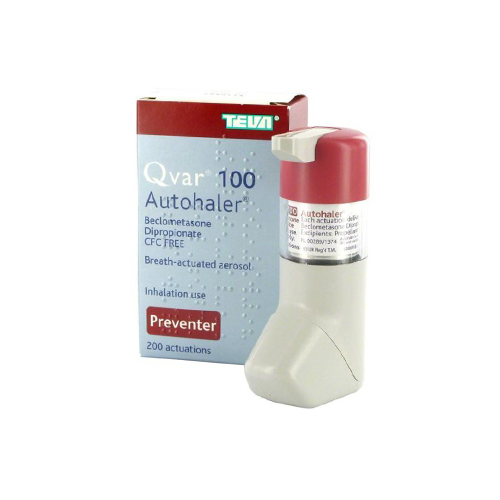- Asthma preventer
- Reduces inflammation
- Contains Beclomethasone
Qvar Autohaler
Qvar Inhalers are used to help prevent the symptoms of mild, moderate or severe asthma. The active ingredient, beclometasone, is a corticosteroid. They reduce the swelling and irritation in the lungs, and so ease breathing problems.
About Qvar Autohaler
What is Qvar
Qvar inhalers are used to control the symptoms of asthma. Qvar inhalers contain the active ingredient beclomethasone dipropionate, this is a synthetic corticosteroid.
QVAR inhalers are, therefore ‘preventers’ and should be used to prevent the occurrence of asthma symptoms.
How does Qvar work?
Qvar Inhalers contains the active ingredient beclomethasone dipropionate, this is a synthetic corticosteroid.
Beclomethasone works by reducing inflammation along the inner airways. The additional benefit of delivering an aerosolised corticosteroid is that it lines the airways and remains there. This produces a localised protective anti-inflammatory effect, it protects the airways from potential triggers of inflammation (e.g. toxic chemical inhalation) and therefore less likely to suffer from an asthma attack.
Benefits of using Qvar inhalers?
There are three different types of QVAR inhalers.
- Aerosol Inhaler
- Easi-Breathe Inhaler
- Autohaler
QVAR inhalers are an effective preventer, they have been shown to be particularly beneficial in those with mild to moderate asthma.
How to use Qvar
How do I use Qvar?
Follow the instructions from your doctor or those provided in the information leaflet that comes with the product. There are also illustrations on the patient information leaflet to help you. It is advisable that you are trained on the correct and efficient use of the inhaler by either your doctor, nurse or pharmacist.
The medication should be inhaled through the mouth. It is usually a twice-daily dosage. Dosages can be altered by your doctor based on your age, severity and response to the therapy.
If you are using other types of inhalers at the same time, we advise you to wait at least 60 seconds before using a different inhaler. Qvar inhalers contain a corticosteroid and should be used last.
To prevent dry mouth, hoarseness and oral yeast infections from developing, it is recommended you rinse your mouth with water after use. Spit out hygienically after rinsing.
It is good practice to record how many inhalations (doses) you have taken; when you have reached the full dosage stated on the inhaler, discard the inhaler.
It is important to use the medication regularly, use the inhaler at the same time each day.
Do not stop using this medication unless on your doctor’s advice.
Do not increase the dosage without consulting your doctor, this will not help your symptoms but may increase your risks of side effects.
This medication starts to work within 24hours of taking it, the full benefits may take up to 3 weeks to achieve.
Side effects & precautions
Precautions
Tell your doctor about all the prescription and over-the-counter medications you use. This should include any medications prescribed by other doctors and those you have bought over the counter.
Pregnancy
Qvar Inhalers should be used only when prescribed by your doctor during pregnancy. There are rare reports of harm to a foetus when the mother took other corticosteroids. Infants born to mothers who have been using high doses of beclomethasone for an extended time may have hormone problems.
Breastfeeding
Consult your doctor before breastfeeding.
Side-effects
Side-effects
Like all medicines, Qvar inhalers can cause side effects, although not everybody gets them.
Rare serious allergic reactions have occurred known as anaphylactic or anaphylactoid reactions.
STOP taking a Qvar inhaler and contact your doctor or go to your nearest hospital casualty department IMMEDIATELY if you notice any of the following symptoms:
- difficulty breathing
- swelling of the face, lips, tongue and throat
- chest pain
- shock, fainting or collapse
Common side effects
- stomach upset
- nausea
- vomiting
- headache
- sore throat
- stuffy nose
- sinus pain
- cough
- dryness in your mouth/nose/throat after use
- unpleasant taste in the mouth
- hoarseness
- deepened voice
Reporting of side effects
If you get any side effects talk to your doctor or pharmacist. This includes any possible side effects listed on the attached leaflet. You can also report side effects directly via the internet at www.mhra.gov.uk/yellowcard. By reporting side effects, you can help provide more information on the safety of this medicine.




We’re here to help.
Our friendly team is available to help Monday to Friday 9:00am - 5:00pm.
If you need urgent assistance, do not use this service. Call 111, or in an emergency call 999.

